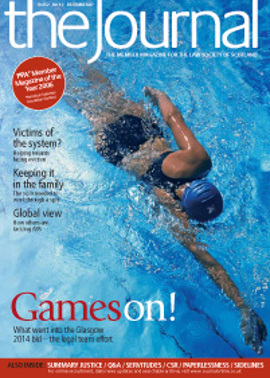OFT-related FAQs

Q. What is a super-complaint?
A. A complaint under the Enterprise Act 2002, by a “designated consumer body” (designated by Ministers of the Crown by order), that any feature or combination of features of a market in the United Kingdom for goods or services is or appears to be significantly harming the interests of consumers.
Q. How is a super-complaint made?
A. In writing to the Office of Fair Trading (OFT).
Q. Who made the super-complaint concerning the Law Society of Scotland?
A. The Consumers Association, a company and charity (registered in England & Wales) and designated body. Which? Ltd, the publisher of Which? magazine, Gardening Which?, Computing Which? and Holiday Which?, is the UK market leader for subscription consumer interest magazines and a wholly-owned subsidiary of the Consumers Association. It is the proprietor of the registered trade mark “Which?”
Q. Has the OFT published guidelines for bodies making a super-complaint?
A. Yes. You can find them here: www.oft.gov.uk/advice_and_resources/resource_base/super-complaints/.
They include an annex setting out the evidence and analysis to be provided in the super-complaint.
Q. Did the super-complaint by the Consumers Association follow the OFT Guidelines?
A. You decide. You can find the Which? super-complaint here:
www.which.co.uk/portals/P/campaigns/ (select“in Scotland”).
Look for evidence, market definition and analysis.
Q. When a super-complaint is made, what must the OFT do?
A. The OFT must publish a response stating how it proposes to deal with the complaint, and in particular:
- whether it has decided to take action, or to take no action, in response to the complaint; and
- if it has decided to take action, what action it proposes to take.
Q. What action can the OFT take under the Enterprise Act in response to a super-complaint?
A. The OFT can:
- make a market reference to the Competition Commission;
- or accept undertakings from service providers about their conduct.
Q. What undertakings could Scottish solicitors have given to the OFT about their conduct relative to the Multi-Disciplinary Practice Rules of the Law Society of Scotland?
A. None. The rules are not an agreement. Obedience to them is not voluntary; it is a legal requirement.
Q. What action can the Competition Commission take under the Act when a market reference is made to it?
A. The Competition Commission can:
- prohibit the making or performance of an agreement;
- require the parties to an agreement to terminate the agreement;
- prohibit specified abusive conduct on the market concerned;
- accept undertakings.
Q. What undertakings could Scottish solicitors have given to the Commission about their conduct relative to the Multi-Disciplinary Practice Rules of the Law Society of Scotland?
A. None. The rules are not an agreement. Obedience to them is not voluntary; it is a legal requirement.
Q. What action could the Commission take under the Enterprise Act if a market reference was made to it about the Multi-Disciplinary Practice Rules of the Law Society of Scotland?
A. None, for the same reason.
But it could, if it wanted to, recommend changes in the law.
Q. What action did the OFT in fact take under the Enterprise Act in response to the super-complaint about the Multi-Disciplinary Practice Rules?
A. The OFT took no action under the Enterprise Act.
Q. If the OFT decided to take no action under the Enterprise Act, did that Act not oblige it to state that it was taking no action?
A. Yes.
Q. Did the OFT state that it was taking no action?
A. No, it stated that “taking no action is not an option”.
Q. Wasn’t sending the Cabinet Secretary for Justice a copy of its response to the super-complaint an action under the Enterprise Act?
A. No.
Q. What was it then?
A. Nothing to do with the Enterprise Act or the Competition Act or the Solicitors (Scotland) Act.
Q. What has the OFT to do with the Multi-Disciplinary Practice Rules of the Law Society of Scotland?
A. The statutory role of the OFT is set down in the Solicitors (Scotland) Act. When any rules that might have the effect of prohibiting a multi-disciplinary practice are made or reviewed, the Cabinet Secretary for Justice must ask the OFT for its advice on the rules. The OFT must respond by giving its advice. Then the Cabinet Secretary must consider the advice and decide whether (even if the OFT has advised against it) the interests of justice require the rule. This has to be done before any new rule can be submitted to the Lord President to be made law.
Q. When the Cabinet Secretary for Justice asks for its advice, can the OFT simply re-issue its response to the super-complaint, this time as advice?
A. No. The Cabinet Secretary is entitled to expect the advice of the OFT to be objective, evidence-based and up to date.
Q. Is the Cabinet Secretary’s discretion to approve or reject a proposed or reviewed rule subject to any legal constraints?
A. Yes. He has to ensure that there is no breach of the Community obligations of the United Kingdom, in this case the obligations in article 25 of the Services Directive. Multi-disciplinary practices can be allowed only after a regulatory scheme has been devised and put in place that will ensure:
- that conflicts of interest and incompatibilities between certain activities are prevented; and
- that the independence and impartiality required for certain activities is secured; and
- that the rules governing professional ethics and conduct for different activities are compatible with one another, especially as regards matters of professional secrecy (which, in the United Kingdom, covers “legal professional privilege”).
Q. What exactly does that mean?
A. The European Court of Justice has held that the principle of the protection of the confidentiality of written communications between lawyer and client is essential to the effective exercise of the rights of the defence. It has also held that the principle of legal professional privilege is closely linked to the lawyer’s role as collaborating in the administration of justice by the courts because every person must be able, without constraint, to consult a lawyer whose profession entails the giving of independent legal advice. The requirement as to position and status as an independent lawyer is based on a concept of the lawyer’s role as collaborating in the administration of justice by the courts and as being required to provide, in full independence, and in the overriding interests of the administration of justice, such legal assistance as the client needs.
Q. Who counts as an independent lawyer? Just advocates or just solicitors or a mix of just advocates and just solicitors? Anyone else?
A. The answer comes partly from article 23.2 of the Third Money Laundering Directive. This recognises that legal professional privilege (unlike mere client confidentiality) prevails over the reporting obligations of a notary, independent legal professional, auditor, external accountant and tax advisor (sic), but only in respect of information received from or given to the client in the course of ascertaining their legal position, or in connection with defending or taking or not taking legal proceedings. Because of this, s 330 of the (UK) Proceeds of Crime Act was amended (in 2006) to embody the idea of a “relevant professional adviser” – an accountant, auditor or tax adviser (sic) who is a member of a professional body that tests competence, imposes and maintains ethical and professional standards, and imposes sanctions for non-compliance.
Q. How does that affect the discretion of the Cabinet Secretary for Justice?
A. If advocates (or barristers) or solicitors go into practice with people who are none of these, that practice cannot give legally privileged advice and help to its clients, unless the practice members who are not advocates (or barristers) or solicitors are members of another profession that has compatible rules and the same ability to impose sanctions on them for breaches of discipline. If new Multi-Disciplinary Practice Rules failed to preserve the ability to give legally privileged advice, then a Community obligation of the United Kingdom would have been broken, as the word “solicitor” would cease to signify a member of an independent legal profession.
Q. What if a majority of the members of a partnership or incorporated practice had to be advocates or solicitors and the minority had to be fit and proper persons but did not have to be “relevant professional advisers”?
A. If the minority members are not personally subject to disciplinary sanctions then the practice is not a collective whose members are all people who could be subject to personal sanctions from their own regulator for misconduct.
That does not seem to be what is envisaged by the Services and Money Laundering Directives.
Q. What would be the legal risks in going too far?
A. Breach of the Services Directive. Ultimately exclusion of the professions of advocate (or barrister) and solicitor from the sector-specific Legal Services Directive and Legal Establishment Directive. Consequent need for clients to consult non-UK lawyers in order to be sure of legal privilege.
Q. What would be the legal risks in not going far enough?
A. Any legal challenge would have to be based on the first part of article 25 of the Services Directive. The challenge would be to the effect that the existing restrictions on multi-disciplinary practices go further than “is justified in order to guarantee compliance with the rules governing professional ethics and conduct, which vary according to the specific nature of each profession, and is necessary in order to ensure their independence and impartiality”.
Q. How easy would it be to mount a challenge on that basis?
A. A lot less easy than it would be to challenge new Multi-Disciplinary Practice Rules on the grounds that they fail to safeguard the independence of the legal professions.
Q. Why do the answers so far refer so much to the United Kingdom rather than to Scotland?
A. Because the European Community considerations apply to all the legal professions in all parts of the United Kingdom. The part of the UK that takes the first steps towards multi-disciplinary practices will be the part that tests the impact of the Services Directive and the Third Money Laundering Directive.
James McLean is a partner in Burness, Edinburgh
In this issue
- Discounting justice
- Common sense prevails
- Common sense prevails (1)
- Shaping the future
- Working in a one-stop shop
- Christmas lesson
- Games City
- OFT-related FAQs
- Sea change around the globe
- Covering the money gap
- Pre-trial priorities
- Personal touch
- Keeping money clean
- The lions sleep tonight
- Conversion course
- Family law risk management
- Too well known to challenge
- Temp sheriffs immune after all
- Camels and common sense
- Tough at the TUPE
- Are bloggers fair game?
- "This ain't tiddlywinks, mate"
- Scottish Solicitors' Discipline Tribunal
- Website reviews
- Book reviews
- Defining moment
- Clear view
- Joint conference success






